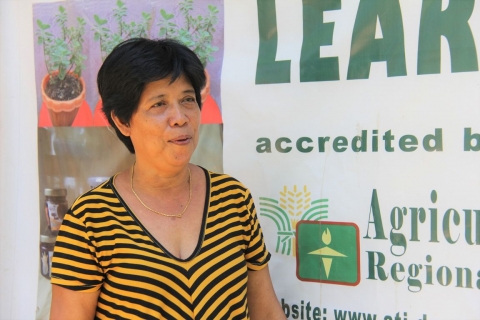For retired teacher Ellen A. Rosario, life in the farm via Queensland Herbs and Tourism Farm is just another chapter at 56, being a teacher and sharer of various farming technologies. To date, Ellen is preoccupied raising and expanding her free range chicken venture despite the pandemic.
Since retiring on January 1, 2016 as a public teacher, Ellen Acain Rosario embarked a life of productivity in her hometown in Bacolod, Lanao del Norte. Her 40 years of teaching and empowering young minds are now punctuated with more time spent in her established farm Queensland.
Queensland was derived from the name “Queenie”, her only daughter who is a former Overseas Contract Worker (OCW) and now co-manager of the farm located at Purok 2, Demologan, Bacolod, Lanao del Norte. Queensland Herbs and Tourism Farm is a coconut-based integrated diversified farm, intercropped with fruit trees, organic herbs, and spices. Free range chickens and goats are also raised in the farm.
“I am aware that there is a demand for native chickens in the country, and the growing demand among restaurants to keep up their popular native dishes like adobo and tinola. For that, I have decided to tap such market for organic and free range chicken”, Ellen said.
Ellen’s parents started planting fruit trees, vegetables and ornamentals ten years ago. However, it was more treated as a hobby than a serious venture. Ellen finds joy in planting crops and raising livestock, and is only hampered by time constraints as she was still a teacher then.
“There is a preference among consumers for free range and native chickens because they are organically-grown and fed, and their meat is tastier. Personally, I prefer to raise free range chickens or native because they survive better under local conditions and they require less care. Also, they are our source of eggs for home consumption and can earn us extra income”, she said further.

In practice, most chickens stay close to water and food source, which is usually located inside the chicken house. Ellen provided large, open structures through growout houses where her chickens are free to walk around and commune with other chickens.
As livelihood support, Ellen was given 25 heads of upgraded native chickens (crossed with Plymouth and Austrolorp or Hubbard) in 2018 by the Agricultural Training Institute-Regional Training Center-10 (ATI-RTC 10) in El Salvador City through the Department of Agriculture’s National Livestock Program. Her experience raising pure-bred led her to shift raising crossed-bred chickens since the former demands more time and care.

“I bought an incubator for the eggs since I like the egg quality my chickens produced (which I sell it at five pesos per piece). Of course, that’s the result of feeding them with locally-sourced feeds, bran, and grains. Whenever I notice that they are sluggish and not in good shape, I feed them with chili to boost their immunity from diseases. I only resort to giving them capsules if it’s really necessary”, Ellen pointed out.
During this pandemic where a lot of problems occur, the income brought by sale of chickens and eggs is a very big relief. For Ellen, hearing the early morning chicken cluck and harvesting eggs is a therapeutic activity in these trying times.
In order to receive organic certification, Ellen obtained an NC-II certification from TESDA, where she is now one of the farmers certified to produce organic vegetables and fertilizers after completing the course on Full Qualification on Organic Agricuture Production.

As part of the “pass the gift” scheme, there are more than 10 farmers in her neighborhood who are now engaged in raising free range chicken after Ellen gave them a pair of chickens. This is a testament of her growing chicken enterprise despite the pandemic since she now has regular “suki” or patrons which include her Muslim friends which she sells her chickens at P200 per kilo.
The turning point for Ellen and her family happened in 2013, when a staff from the Municipal Agriculture Office (MAO) introduced them to ATI. A team from the center visited the farm and saw the actual situation of the area. The beautiful ornamentals which Ellen tended with care were in full bloom. Various kinds of crops were just planted everywhere, a strong indication that the family owning the farm is industrious, but needs more knowledge in the intricacies of farming. The ATI group suggested replanting, rehabilitation and re-arrangement.
That visit became the start of a fruitful partnership between Queensland and ATI. Presently, Queensland is recognized as a Learning Site for Agriculture (LSA) of ATI-RTC 10. Eventually, Ellen and her husband along with Queenie worked hard to make Queensland Herbs and Tourism Farm a byword among farm visitors. They are usually invited by ATI as resource persons on herb production and processing.

ATI was instrumental in capacitating the Rosario’s. After attending various trainings, more farm enterprises were added. They also built a training hall and dormitory to accommodate participants of trainings and visitors as the farm continue to become popular.
To date, Queensland is a GAP-certified farm for herb and spice production.

